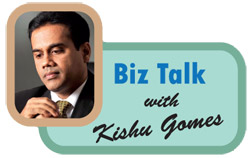 Understanding Sri Lankan consumer insights critical
The past 10 years saw the entry of marketeers of a different breed in
Sri-Lanka. It's great to see young boys and girls from top Colombo
schools and international schools entering the field. Some with Degrees
from global universities, which has a positive impact on the profession.
The foundation to marketing success, is the understanding of the
target consumer and having a consistent focus on them to observe,
analyse and understand the changing behaviour for continuous
re-alignment of strategy for communication effectiveness. We all know
that the behaviour patterns of the Sri-Lankan consumer are cyclical.
You must be a Sri Lankan to understand Sri Lankan demographics which
are typical characteristics of your target market - the people who buy
your products or services which anyone can easily comprehend but
psychographics are not. Demographics help you understand who buys your
product or service, while psychographics helps you understand why they
buy.
Psychographics go beyond the visible external behaviour. It is to
focus on your target customers psychology, lifestyles, beliefs and
attitudes. These are inner feelings and characteristics of the consumer.
Understanding psychographics takes a lot more effort.
This requirement is so fundamental to build a wining brand. Who can
do this best; surely it is the people who are close to the consumer.
For most leading Fast Moving Consumer Goods companies in Sri Lanka,
the target consumer base is over 10 million. Young marketers need to
understand the psychographics of every consumer segment from South to
North and East to West to develop effective communication messages,
select the best media mix and to make the right communication channel
choices.
The common complaints against the 'Mod Marketeer' are that the modern
marketer speaks fluent English but poor Sinhala; some very poor or no
Sinhala. Writes good English but horrible Sinhala, watches satellite TV
and not local TV channels, uses independent rating done by external
organisations covering a sample audience, doesn't use the channel
partners and own sales force feedback.
The modern marketer doesn't do enough market visits to spend time
with channel partners, customers and the frontline sales people, instead
use the information available to him in office to strategise and
determine brand positioning. The modern marketeer's ability to think
like the consumer does is limited. This leads to misaligned decisions
thus wasting marketing funds.
The 'mod consumer's' behaviour is complex. The pace of consumer
lifestyle change is rapid but there can be a conflict between explicit
and implicit traits of the consumer. In public the 'mod consumer' would
eat a burger and at home he would prefer to have red rice with kiri kos
curry and pol sambol.
The same consumer who swims in the pool of a five star hotel in
Colombo prefers to bathe in a tank in the village over the weekend.
Young marketeers should not lose sight of the diverse behaviour of the
targeted customer.
Keeping the ear to the ground, exposure to the culture of the
consumer, staying tuned to the attitudinal and lifestyle changes are key
success factors for 'mod marketers'.
From a business perspective, mod markeeters need to understand that
if marketing is to succeed at the heart of an organisation, they must
truly represent the voice of the consumer.
Marketing is about shareholder value and that's the kind of marketer
the organisation needs to develop. It's about people who can have an
impact on the profit of an organisation. To do this effectively,
understanding true Sri Lankan consumer insights is critical.
|

